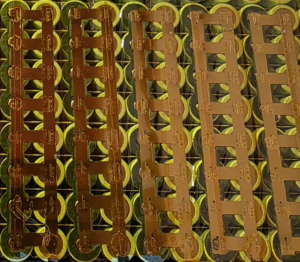Professional repair instead of buying new
When a battery starts to fail, the cause is usually the cells inside it—not the entire device. Instead of making expensive new purchases, it is worth having the cells replaced by a professional: aged or defective cells are replaced with high-quality premium cells, the battery management system (BMS) is checked, and the battery is then tested under real-world conditions.
Typical areas of application
Tool batteries (e.g., Bosch, Makita, Hilti, DeWalt)
E-bike batteries
Garden tool batteries (lawn mowers, hedge trimmers, leaf blowers, etc.)
Special and industrial batteries with 18650 or 21700 cells
Note: Only batteries with a nominal voltage of 50 V or less are processed.
Repair process
Checking the battery
Visual inspection, voltage measurement, and functional test.Discharge and capacity test
Stress under load to determine residual capacity and stability.cell exchange
Replace with branded 18650 or 21700 cells (premium quality, e.g., Samsung, LG, or Panasonic).BMS and safety test
Check and, if necessary, repair the battery management system (balancing, overload and deep discharge protection).Load test and stress test
Complete charging cycle, followed by a practical test under load.
Advantages of cell replacement
Cost-effective alternative to buying new
More power and longer runtime thanks to modern premium cells
Sustainability through reuse of housings and electronics
High level of safety thanks to testing under real-life conditions

Shipping and handling
A cell replacement will be carried out after the battery has been returned or shipped:
On-site drop-off: The battery will be accepted and repaired within a few days, then made available for collection.
Shipping: Upon agreement, the battery can be sent by mail, preferably via GLS. Once all work has been completed, the battery will be returned.
Frequently asked questions
How long does a cell replacement take?
Depending on the battery type and cell availability, the processing time is usually 3–7 business days.
Can defective BMSs also be repaired?
Yes, provided this is technically possible. If a BMS is irreparably damaged, a replacement can be obtained in many cases.
Is it possible to replace the cells in every battery?
In most cases, yes, as long as the housing can be opened and there are no encapsulated special solutions.
Is there a voltage limit?
Yes. For safety reasons, only batteries with a nominal voltage of 50 V or less are processed.
Can the capacity be increased?
Modern cells often allow for higher energy density. Whether this is sensible and safe depends on the type of battery.
Submit a request
For a non-binding inquiry, simply send us a short message with details of the battery type and intended use. We will then discuss how to proceed.
